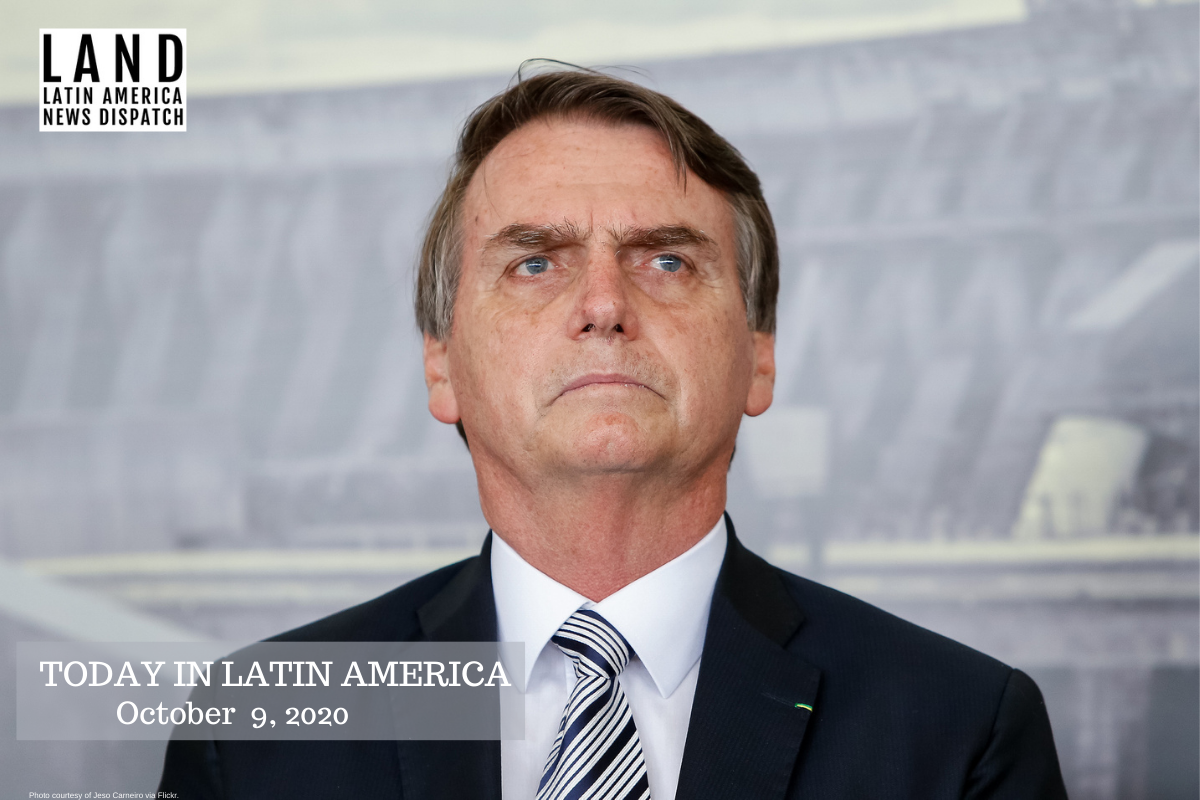

Brazilian President Jair Bolsonaro has been skeptical of the severity of the coronavirus, previously falsely equating it to a “little flu.” (Photo courtesy of Jeso Carneiro via Flickr)
BRAZIL: Brazil’s coronavirus cases surpassed five million, making it the third country with the highest number of infections after the United States and India. With 734 added to the death toll on Tuesday, Latin America’s largest country is approaching the 150,000 death mark, the second highest worldwide after the United States. São Paulo remains the region with the highest number of cases, followed by Bahía and Mina Gerais. The curve seems to be flattening, but experts still agree the situation remains “worrying.” Brazil’s health ministry reported 5,000,694 COVID-19 cases and 148,228 coronavirus-related deaths as of Tuesday.
President Jair Bolsonaro has remained a coronavirus skeptic since the beginning of the pandemic and compared it to a “little flu.” A recent Datafolha poll, however, shows 37% of respondents approve of his administration, and 47% don’t blame him for the fast rising death toll.
HEADLINES FROM THE WESTERN HEMISPHERE
SOUTHERN CONE
ARGENTINA: Argentina recorded its highest number of coronavirus cases in a single day on Wednesday, pushing the total number of infections to 840,920. In 24 hours, the country had a positive count of 16,447 cases. The most affected areas are Buenos Aires, the northeast region of Tucumán, Santa Fe and Córdoba. The Buenos Aires Times reported that on Friday President Alberto Fernández will announce Argentina’s next steps.
THE ANDES
ECUADOR: Petroecuador is suing Odebrecht for 280 million dollars for breaching its contract to construct the Pascuales Cuenca Poliducto (PPC). The lawsuit accuses Odebrecht of not finishing the project and taking longer than estimated. The project, created to avoid the use of field tanks to save the country a significant amount of annual resources and time, is also said to be unstable and is hurting the PPC’s functionality. The lawsuit arose in a critical moment for Odebrecht since the company was also accused of bribery in 2016 and still has a complicated relationship with Ecuador.
THE CARIBBEAN
PUERTO RICO: President Donald Trump’s appointment of Justin Peterson to the Financial Oversight and Management Board for Puerto Rico faced mixed reactions on Thursday. Peterson is the managing partner of DCI Group, a major Washington, D.C. publicity firm specializing in representing creditors, and he has worked on behalf of creditors in the bankruptcy case of Puerto Rico. Commentator Cate Long thinks positively of the appointment and thinks Peterson understands Puerto Rico Oversight, Management, and Economic Stability Act’s (PROMESA) purpose to return fiscal responsibility to Puerto Rico. A U.S. representative sees the appointment as Trump’s attempt to undermine the interests of Puerto Ricans. Resident Commissioner Jenniffer González, the island’s sole representation in Congress, opposes the pick for ethical reasons, saying that the appointment creates the appearance of a conflict of interest.
CENTRAL AMERICA
COSTA RICA: Costa Rica will open its aerial borders to visitors from other Central American countries on October 15 to promote tourism and to revive the economy, Minister of Tourism Gustavo Segura announced on Thursday. The countries include Belize, Guatemala, El Salvador, Honduras, Nicaragua and Panama. In 2019, 145,000 Central Americans from Guatemala, El Salvador and Panama were registered to visit Costa Rica, and they are “strategically important” since they are the major visitors in business and tourism is vital to Costa Rica’s economy, explained Segura. The travelers are required to provide a negative test of COVID-19 taken 72 hours in advance.
HONDURAS/GUATEMALA: The Honduran government is no longer willing to receive the solid waste in the Motagua River carried to the Honduran coast from Guatemala. The Presidential Commissioner for the Motagua River, Liliam Rivera, met with the Department of Natural Resources and Environment of Guatemala and urged them to repair the biofences in the river that are not fully functioning, adding that they are not a definitive solution to an urgent issue that requires immediate action. Sergio Izquierdo, National Geographic photographer and director of Rescue the Planet, agreed, saying that the biofences in the Motagua River are insufficient and ineffective to curb the tons of plastic and waste that the currents brought to Honduras. The trail of waste spans 472 kilometers.
NORTH AMERICA
MEXICO: Mexican authorities have found 37 bodies and 20 skulls in three mass graves in Guadalajara’s metropolitan area. Jalisco authorities found the mass graves in the municipalities of Zapopan, Ixtlahuacán de los Membrillos and El Salto. According to a report published by the Interior Ministry, 4,092 mass graves and 6,900 bodies have been found between 2006 to 2020. Jalisco stands as the state with the highest number of mass graves, followed by Veracruz, Tamaulipas, Guerrero, Sinaloa and Zacatecas. The state of Jalisco is known as the base of the Jalisco New Generation Cartel. According to the U.S. Drug Enforcement Agency, it is one of Mexico’s “most powerful and fastest growing” drug cartels. Internal disputes in the gang could be the reason for the uptake in violence in the area.
UNITED STATES: Former Attorney General Jeff Sessions and former Deputy Attorney General Rod Rosenstein called for the separation of children “no matter how young” they were, according to The New York Times. An 86-page draft report on Michael Horowitz’s investigation into the “zero tolerance” policy cited more than 45 interviews with key officials and reviews of documents. Horowitz notes in the report that, even though the blame fell on Trump and the Department of Homeland Security, Sessions was on board with the separations because it would lessen migration. According to The New York Times, a prosecutor described what Sessions said in a note: “If you care about kids, don’t bring them. Won’t give amnesty to people with kids.”
***


